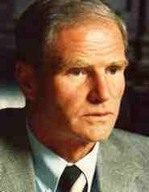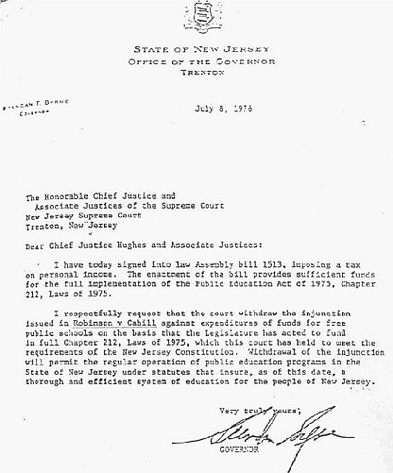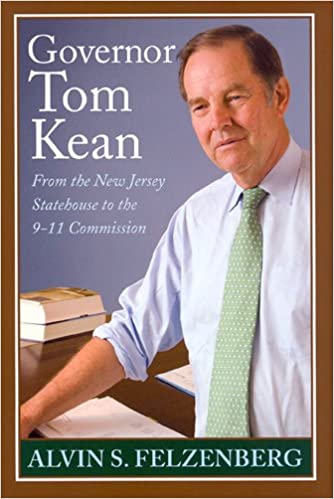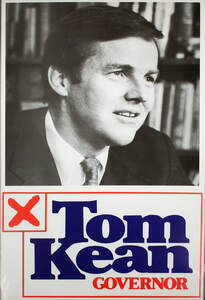|
* Home
* History * Population * Government * Politics * Lobbyists * Taxes * State Symbols * Biographies * Economy * Employers * Real Estate * Education * Recreation * Restaurants * Hotels * Health * Environment * Stadiums/Teams * Theaters * Historic Villages * Historic homes * Battlefields/Military * Lighthouses * Art Museums * History Museums * Wildlife * Climate * Zoos/Aquariums * Beaches * National Parks * State Parks * Amusement Parks * Waterparks * Swimming holes * Arboretums More... * Gallery of images and videos * Fast Facts on key topics * Timeline of dates and events * Anthology of quotes, comments and jokes * Links to other resources |
History-- 1970s & 1980s: Cahill, Byrne & Kean* Native Americans * Exploration and Settlement * British colony * Royal governance * Path to Revolution * Revolutionary War * Industrialization * Civil War * Post-War Economy & Reform * Woodrow Wilson as Governor * World War I & 1920s * Great Depression * World War II * Post-War Development * 1960s & Richard Hughes * 1970s & Income tax * 1990s-Whitman & Florio * 9/11 & McGreevey Administration * Codey & Corzine * Chris Christie * Phil Murphy 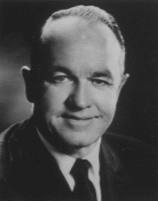 William Cahill. Image: New Jersey State Archives William Cahill. Image: New Jersey State Archives
-- 1973 election
The 1973 election took place as the ongoing Watergate scandal evolved which ultimately would lead to the resignation of President Richard Nixon in July of the following year. In New Jersey, Republican Governor William Cahill had been elected in a landslide in 1969, decisively defeating former Governor Robert Meyner's attempt to return for a third term after being out of office for eight years. After his inauguration, Cahill had aggressively pushed for expanded support of environmental, education and social service programs, which included his creation of the Department of Environmental Protection. He also proposed development of a sports complex in the Meadowlands, anchored by a race track and a new stadium pursuant to an agreement he reached with the New York Giants of the National Football League to relocate from New York. But Cahill's policies had clashed with the more conservative wing of his party, particularly in his unsuccessful efforts to enact an income tax. More significantly, his reputation, as a former FBI agent who had run in 1969 attacking political corruption, had been damaged by charges that led to the conviction in 1972 of his former Secretary of State Paul Sherwin for trying to fix a $600,000 state highway contract for a contractor who then kicked back $10,000 to Republican fund-raisers with close ties to Cahill.
Nonetheless, as the 1973 campaign began, Cahill was viewed by most analysts as likely to win re-election. Yet in April federal indictments (on which they were convicted in the next year) charged Nelson Gross, the Republican state chairman who helped secure Governor Cahill's 1969 nomination, and Joseph McCrane, who was the Governor's campaign finance chairman and later named state Treasurer, of coaching executives to illegally designate contributions to the Cahill campaign as business tax deductions. In June, Congressman Charles Sandman of Cape May, one of the remaining Republican congressmen continuing to defend the Nixon White House against the Watergate allegations, defeated Cahill in the Republican gubernatorial primary election. Brendan Byrne, a former aide to Governor Meyner and Essex County Prosecutor who resigned as a state judge to enter the race, was nominated as the Democratic candidate.
As the election was entering its final weeks in October, war in the Middle East broke out with the surprise attack by Egypt and Syria on Israel in the so-called Yom Kippur War, which was followed by the Arab oil embargo that sharply cut imports and led to a spike in the price of gasoline and heating fuel. The inflation in energy prices further undermined New Jersey's economic position, which had seen a loss of much of its heavy industry to locations in sunbelt states or foreign nations. During the 1970s, New Jersey's unemployment rates would hit levels not seen since the Great Depression of the 1930s.
Just before election day in November, the House Judiciary Committee chaired by Democrat Peter Rodino of Newark began its Watergate investigation which led to later hearings on the potential impeachment of President Nixon. In the election, Byrne was elected governor in the largest landslide to that point in the state's history with over 66% of the total vote.
|
 Trail in the Pinelands. Image: Wikimedia Commons Trail in the Pinelands. Image: Wikimedia Commons
Apart from the income tax, Byrne's eight years in office saw the development of the New Jersey Sports complex with Giants Stadium and the indoor sports and entertainment arena (controversially first named after Byrne); legislation to protect the resources of the Pinelands; the creation of New Jersey Transit; approval of casino gambling in Atlantic City; the establishment of Liberty State Park; imposition of strict controls on the use and shipment of cancer-causing chemicals; construction of new sewage treatment facilities to end untreated ocean discharges; and the authorization of a state compensation fund to meet losses and finance cleanups of toxic chemical and oil spills, which became the model for the federal Superfund program. Byrne considered the preservation of the Pinelands his most significant achievement. After first encountering difficulty in securing sufficient support in the legislature, he issued an executive order barring most construction until a more permanent planning and regulatory program was enacted. The controversial action promptly was challenged in the courts, but succeeded in building pressure so that Byrne's proposal was enacted as the Pinelands Protection Act. After the law went into effect, a plan developed by the Commission created by the legislation sharply curtailing new construction was approved by the US Department of the Interior pursuant to complementary federal legislation which established the Pinelands National Reserve. -- New Jersey Supreme Court
During Byrne's time in office, the New Jersey Supreme Court, in addition to its landmark role in the Robinson v. Cahill litigation, took other aggressive actions. In 1975, in Southern Burlington County NAACP v. Township of Mount Laurel, the Court held that a system of municipal land use and zoning regulation making it physically and economically impossible to provide low and moderate income housing was unconstitutional. The "Mount Laurel" case subsequently led to controversial state legislation to establish goals for affordable housing in each municipality. In 1976, the Court's In re Quinlan decision held that the father of 21-year-old Karen Ann Quinlan, who had lapsed into a vegetative state after a night of drinking alcohol and taking tranquilizers, was legally able to order her removal from the ventilator thought to be essential to keeping her alive. After the ventilator was disconnected, she unexpectedly continued to breathe on her own, subsequently dying ten years later of pneumonia. The "right-to-die" decision received global attention, and led to legislation in New Jersey and other states defining procedures to be followed in similar situations. |
|
-- Abscam
In February 1980, NBC News reported that the FBI had been conducting an undercover investigation under the code name Abscam in which an agent had been posing as a wealthy Arab purportedly interested in investing in Atlantic City, offering payments for support of his projects from local, state and federal officials. Of over thirty officials who were investigated, those convicted included New Jersey's US Senator Harrison Williams; Congressman Frank Thompson of Mercer County; and state Senator and Camden Mayor Angelo Errichetti. Five members of the US House of Representatives from other states also were found guilty, along with members of the Philadelphia City Council. |
|
|
* Governor Brendan T. Byrne Administration, Eagleton Institute of Politics, Rutgers University * Governor Tom Kean: From the New Jersey Statehouse to the 911 Commission by Alvin Felzenberg * Governor Thomas H. Kean Administration, Eagleton Institute of Politics, Rutgers University Next-- 1990s: Florio & Whitman * Native Americans * Exploration and Settlement * British colony
* Royal governance * Path to Revolution * Revolutionary War * Industrialization * Civil War * Post-War Economy & Reform * Woodrow Wilson as Governor * World War I & 1920s * Great Depression * World War II * Post-War Development * 1960s & Richard Hughes * 1970s & Income tax * 1990s-Whitman & Florio * 9/11 & McGreevey Administration * Codey & Corzine * Chris Christie * Phil Murphy |
